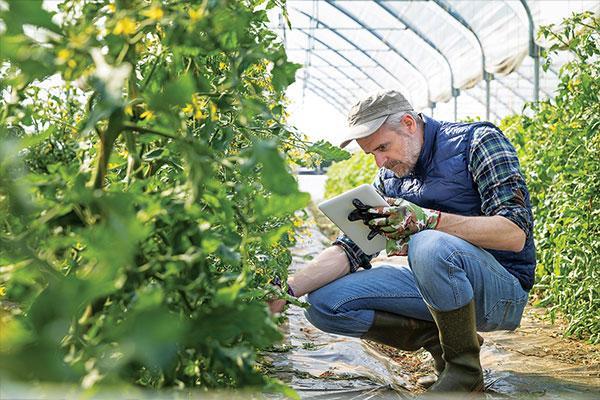Plant protection in EU agriculture
Pesticides are forms of pesticides used in farming and forestry to protect crops and other plants from pests and diseases. They have an important role to play in helping the European Union to achieve its objectives regarding plant health and food security.
However, overuse and other inappropriate uses of pesticides, in particular chemical pesticides, can have a negative impact on soil, water, and agricultural biodiversity. Their use can also have detrimental effects on the environment as well as plant, animal, and human health. The placing on the market and use of pesticides is therefore strictly regulated by EU rules on pesticides.
As part of the Farm to Fork strategy – one of the central pillars of the European Green Deal – the European Commission is setting higher ambitions for sustainable pesticide use. One of these ambitions is that by 2030, the use and risk of chemical and also the use of more hazardous pesticides in the EU should be reduced by 50%.
The common agricultural policy (CAP) is a cornerstone in promoting the sustainable use of pesticides in agriculture, helping farmers to protect their crops and maintain yields, while also protecting agricultural ecosystems and health.
CAP actions
The CAP promotes sustainable agricultural systems in the EU, enabling farmers to:

provide safe, healthy, and sustainably produced food for society;

earn a stable and fair income, taking into account the full range of public goods they provide;

protect natural resources, enhance biodiversity, and contribute to the fight against climate change.
Through a number of rules and measures, the CAP supports farmers in the sustainable use of pesticides.
The CAP 2023-27 promotes further opportunities for sustainable pesticide use.
CAP specific objectives
The sustainable use of pesticides is relevant for a number of specific objectives for the CAP 2023-27, particularly those relating to natural resources and biodiversity.
CAP Strategic Plans
In their CAP Strategic Plans, EU countries have the flexibility to tailor strategies and interventions that can reduce national reliance on pesticides, in line with EU targets.
EU countries’ CAP Strategic Plans combine a wide range of targeted interventions to address their specific needs and deliver tangible results.
The plans must contribute to, and be consistent with, EU legislation and commitments relating to climate and environment.

Conditionality
Under conditionality rules, beneficiaries of the CAP have their payments linked with the respect of a set of statutory management requirements (SMRs) and good agricultural and environmental conditions (GAECs). Conditionality rules relating to pesticides include:
- SMRs which links CAP payments to the EU Regulation on plant protection products and, to the sustainable use of pesticides directive;
- GAECs designed to protect water and soil, which involve the responsible use of pesticides, as well as requirements for biodiversity area.
Eco-schemes
Farmers undertaking sustainable use of pesticides practices beyond the baseline can also be supported through eco-schemes as part of the direct payments under the European Agricultural Guarantee Fund (EAGF). In their CAP Strategic Plans, EU countries must include a number of measures beneficial for the environment, including on the sustainable use of pesticides, and devote at least 25% of their direct payments budget for these schemes. The practices so supported must be more ambitious than the legal requirements (the “baseline”), which includes the SMRs and the GAECS.
Rural development
Farmers undertaking sustainable use of pesticides practices beyond the baseline can also be supported through rural development under the European Agricultural Fund for Rural Development (EAFRD). In their CAP Strategic Plans, EU countries can include a number of beneficial measures:
- agri-environment-climate commitments (AECCs) can support alternative approaches to plant protection, such as non-chemical alternatives to pesticides and integrated pest management. As it is the case for eco-schemes, supported farming practices must go beyond the legal "baseline";
- support for organic farming practices that encourage systems of agriculture with lower pesticide use;
- support for "green investments" such as precision sprayers or early warming systems;
- support for risk management such as insurance schemes to compensate higher risk of yield losses;
- support for knowledge transfer and information, advisory services, and cooperation can be used to spread knowledge and increase innovation in plant protection.
Market measures
Certain sectoral measures include environmental actions in the related operational programmes. These environmental actions may include the promotion of the sustainable use of pesticides. This is the case for fruit and vegetables sector and the wine sector.
Green architecture
All these policy instruments act in coordination and the CAP 2023-27 includes a new green architecture of the above-mentioned policy instruments, which enhances opportunities for alternatives to harmful pesticides.
For example, the enhanced conditionality of the CAP 2023-27 forms a stronger baseline of legal standards regarding the proper use of pesticides. Moreover, a significant portion of the CAP’s budget is devoted to eco-schemes and environmental and climate management commitments, which can support voluntary practices by farmers – more ambitious than the legal baseline – that contribute to the sustainable use of pesticides.
In addition, support for rural development will continue to fund land management payments, investments, knowledge-building, innovation and co-operation relevant to the sustainable use of pesticides.

- General publications
- 26 June 2023
This document provides a detailed overview of the 27 EU members’ key elements and choices in their approved national plans. It also responds to requests for information to summarise what plans contain and aim to deliver.
Knowledge, research, advice and innovation
In order to develop new technologies, techniques and management systems, the Commission supports research and innovation, as well as advice, in agriculture and forestry. Areas of focus include plant health and ecological approaches to farming.
The farm advisory services share knowledge of new developments and advise farmers on best practices for pest control.
Research in action: integrated pest management
In an effort to reduce the reliance on pesticides, the Commission promotes integrated pest management.
One project supported by EU funding is IWMPRAISE, which aims to demonstrate how integrated weed management supports more sustainable cropping systems that are resilient and profitable. The project brings together 37 partners from eight different European countries, including 11 universities and research institutions, 14 small and medium-sized enterprises and industrial partners, and 12 advisory services and end-user organisations.
The EU also supported the creation of the Farmer’s Toolbox for Integrated Pest Management. This database includes many examples of practices, techniques and technologies across eight IPM principles established at EU level and international level. It also includes "crop-specific guidelines" developed by EU countries' national authorities and public bodies to implement the IPM requirements under the Sustainable Use of pesticides Directive (SUD). This toolbox includes good practices to help to replicate some techniques after adapting them to local or regional farm and agro-climatic conditions. It will be updated with additional examples on a regular basis.
Legal bases
Conditionality is governed by:
- rules on support for Strategic Plans drawn up by EU countries under the common agricultural policy (Regulation (EU) 2021/2115) (Delegated Regulation (EU) 2022/126);
- rules on the financing, management and monitoring of the common agricultural policy (Regulation (EU) 2021/2116) (Implementing Regulation (EU) 2022/128).
Eco-schemes, AECCs and investments are governed by:
- rules on support for Strategic Plans drawn up by EU countries under the common agricultural policy (Regulation (EU) 2021/2115).
Related links
Overview of aims, history and current rules of the common agricultural policy, supporting EU farmers and Europe’s food security.
The European Commission pushes for sustainability in agriculture, forestry and rural areas across the EU. The European Commission pushes for sustainability.


